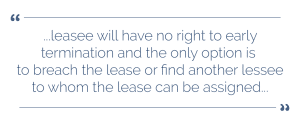Updated on August 1, 2023
What are the most common commercial lease disputes in California? As real estate attorneys that handle many commercial lease disputes, we get to see firsthand which types of lease disputes are the most common for commercial properties. Below, we’ll be breaking down the top four commercial property lease disputes we have seen throughout the years from negotiating the terms of the lease to handling security deposits, maintenance obligations, and rent increases, every aspect requires careful consideration.
Key Takeaways
Some of the most common commercial lease disputes are:
- Nonpayment of Rent: Where the tenant fails to pay rent, leading to possible eviction and lawsuits.
- Repairs and Maintenance: These disputes arise when landlords fail to make required repairs.
- Assignment: Tenants may wish to assign their lease obligations or sublet the property, but landlords may have the right to approve or deny such requests.
- Early Termination: Conflicts may arise when tenants want to terminate the lease early without finding a replacement.
Four Common Commercial Lease Disputes
Commercial leases are often times complex legal documents that are the source of disputes between landlords and tenants. While the majority of commercial leases begin and end without issue, disputes, even if they do not evolve to an actual lawsuit, can arise during the life of a commercial lease.
The following are some of the more common commercial lease disputes that arise between landlords and tenants:
-
Nonpayment of Rent:
The most common source of disputes between landlords and tenants concern the nonpayment of rent. When a tenant fails to pay rent, the landlord can typically, quickly evict the tenant and then file suit for the unpaid rent. Even where tenant takes issue with the landlord for one or more issues concerning the tenancy, rent should still be timely paid in order to avoid forfeiture of the leased space.
-
Repairs and Maintenance:
Landlords are typically the party responsible for maintaining the leased property in a habitable condition. If a landlord fails to make repairs as required under the lease, the tenant may be able to withhold rent or sue for damages.
-
Assignment:
It is not uncommon that tenants wish to assign their lease obligations to another business or sublet the property to a third party. Based on the parties’ lease agreement, landlord may have the right to review and approve, or deny, any assignment or subletting. Granted, requests to assign the lease cannot typically be unreasonably withheld.
For example, in Cohen v. Ratinoff (1983) 147 Cal.App.3d 321, 330, the court held that “where, as here, the lease provides for assignment or subletting only with the prior consent of the lessor, a lessor may refuse consent only where he has a good faith reasonable objection to the assignment or sublease, even in the absence of a provision prohibiting the unreasonable or arbitrary withholding of consent to an assignment of a commercial lease.
Examples of bases for such good faith reasonable objection would be inability to fulfill terms of the lease, financial irresponsibility or instability, suitability of premises for intended use, or intended unlawful or undesirable use of premises. No suchbases were raised by the lessor.”
-
Early Termination:
Where a tenant cannot find someone to take over their lease but nonetheless want to terminate their lease early, conflict can certainly arise. Every situation, typically based on the lease agreement, is different. Sometimes, the landlord will have the right to charge a fee for early termination. Other times, leasee will have no right to early termination and the only option is to breach the lease or find another lessee to whom the lease can be assigned. The circumstances will vary based on the lease.
If you are involved in a commercial lease dispute, it is important to speak with a commercial lease dispute attorney in Los Angeles to discuss your options. An attorney can help you understand your rights and responsibilities under the lease and can bring or defend against a lawsuit if need be. The best way to ensure that you are well protected is to consult counsel before entering into a lease agreement so as to ensure that the issues you are concerned with are properly addressed in writing.
To schedule a consultation with one of our commercial lease dispute lawyer, you can call us directly at (310) 954-1877, text us at (310) 706-2265, or send us a message here.

